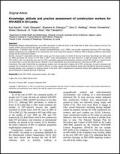Publications - Released in 2009
Human immunodeficiency virus (HIV) prevalence is relatively lower in Sri Lanka than in other Asian countries; however, the number of HIV-infected persons has rapidly increased in recent years. A baseline study on HIV, acquired immunodeficiency virus (AIDS), and sexually transmitted infections (STI) knowledge, attitude, and practice was conducted at two construction sites in Sri Lanka from January to February 2007 to design an effective intervention strategy for the construction workers.
Among 611 respondents (mostly males, mean age 32.8 years), nearly two-thirds lived away from home. Knowledge was fairly good on AIDS prevention but poorer on STI than on HIV. Some misconceptions were also observed. A high percentage did not consider HIV/AIDS as their own personal issue, and over 50% respondents expressed discriminatory attitudes towards HIV positives. Condom access was limited due to social and cultural norms. Mobility was not significantly associated with practice of prevention of HIV and STI.






